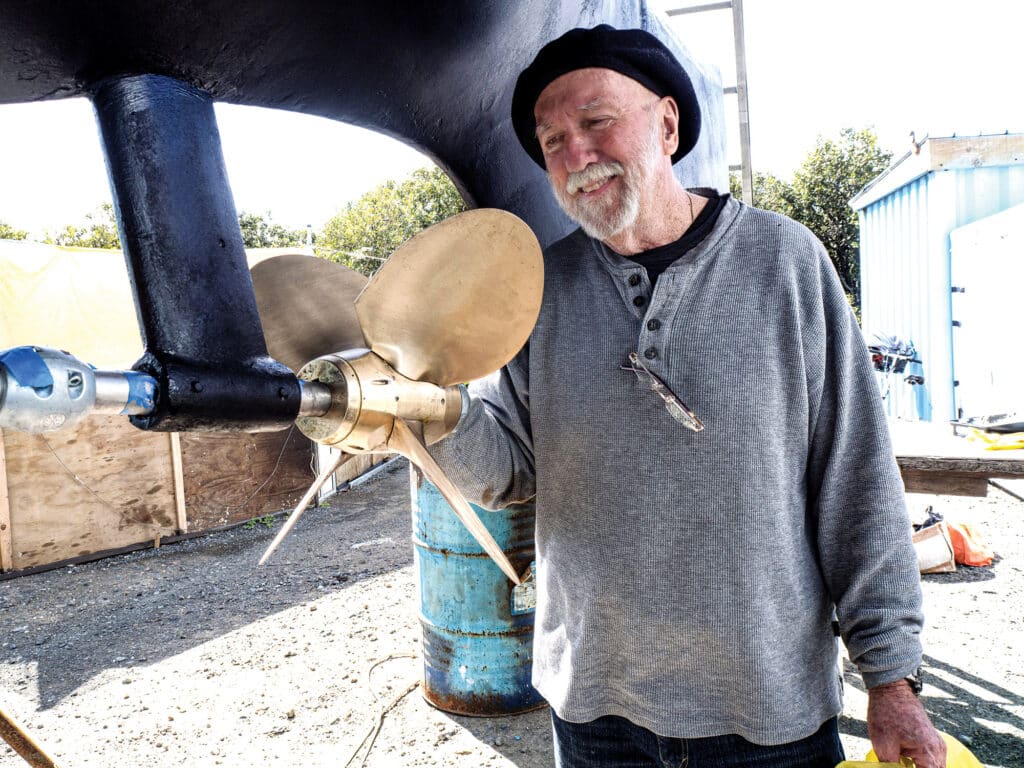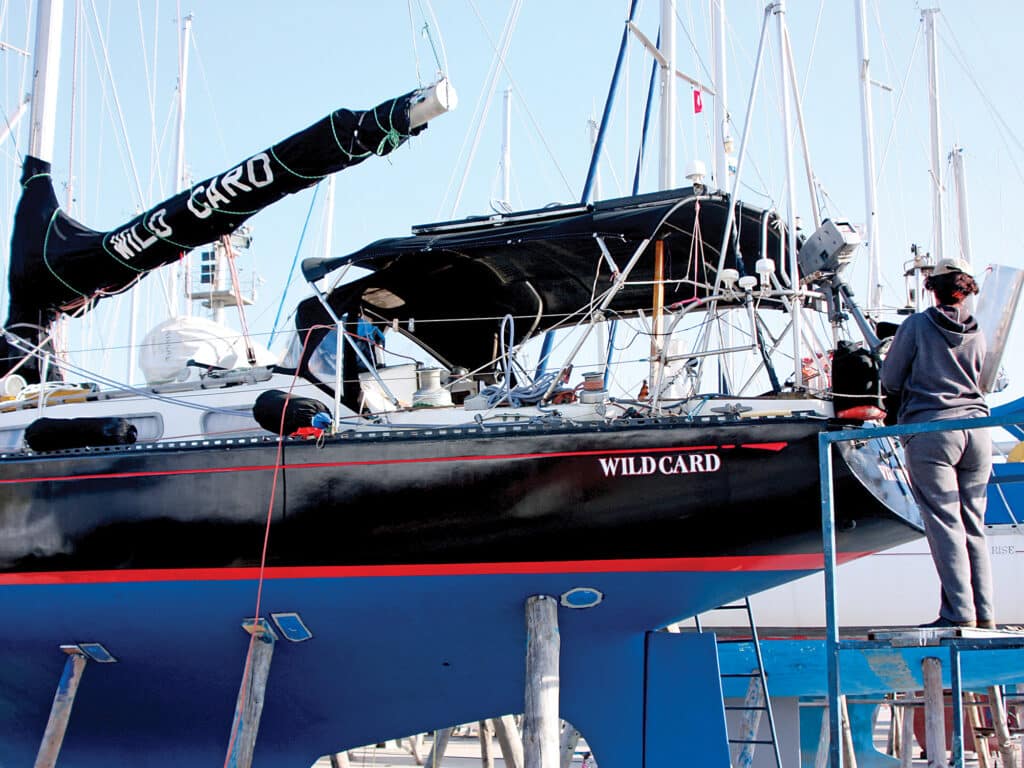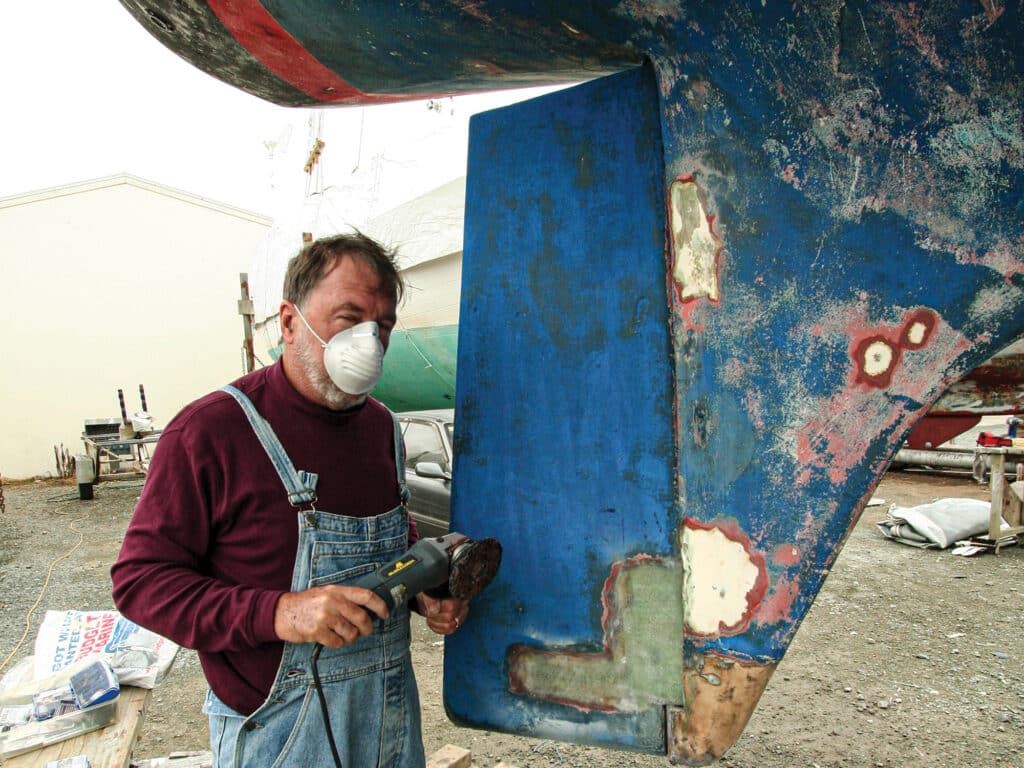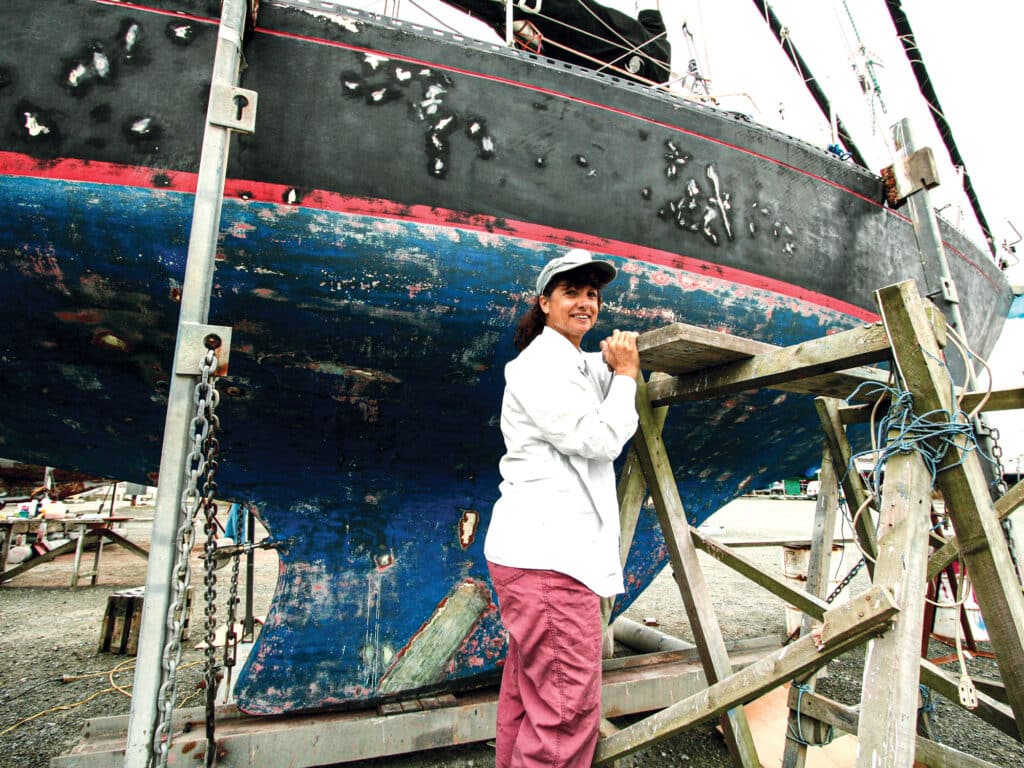
I know nothing about hauling in the good ol’ US of A. The last time I did so was in the early ’80s. However, during the past 20 or so haulouts in foreign waters, I’ve learned a thing or two about being on the hard along distant shores.
Of course, my perspective might not be yours. I have little money, do all my own work, and continue to live aboard while out of the water. Plus, I’m prejudiced. I’d rather haul at a family-run yard managed by boaters than at a corporate-owned yard run impersonally for the benefit of landlubber stockholders.
Is that wrong to admit in print?
I don’t think so. The quality of our lives—my wife, myself and our vessel—is important to us. Hauling is stressful. I’m always on a mission to get my boat back into the water ASAP, and my wonderful cruising life back on track as well.
Obviously, I prefer being surrounded by like-minded people in the shipyard. That means workers and managers who admire determined sailors working on their own vessels and who don’t view us as cheapskates attempting to wreck the yard’s bottom line.
My favorite place to haul is New Zealand. Most of the yards are family-run. Dozens allow you to work on your own boat. In Whangarei, anything you need is within a short bicycle ride of Dockland 5 Marine Ltd. and other wonderful yards. Even better, any marine item you need custom-made, from a small padeye to an entire rig, can be fabricated locally. And it is cheap. And there’s trust. Admiration, even.

I once had an expensive, custom, stainless-steel exhaust flange made to my specs. The fabricator sent it to me for a test fit—not only before I’d paid for it, but also before I even had a chance to send him a deposit. That’s how the farmers and boaters of New Zealand treat one another every day.
South Africa is another great place to haul. While we never have anyone work on our boat, the labor is cheap there, as are the yards. We’ve had great luck in the Caribbean, Trinidad, Australia and Malaysia—even the Med as well.
The oddest, and one of the best, yards we’ve ever hauled at is Rebak Island Resort & Marina on Langkawi, in Southeast Asia. It was so clean that I had to visit the office to ask: “Are you sure you’re OK with me painting my boat here? I mean, I don’t see a drop of antifouling anywhere. I’ve been in doctor’s offices, in hospitals, even, that are dirtier.”
It was like hauling at the Ritz. White-coated Burmese waiters scurried around the yard wearing silk slippers that curled into a circle at the toe. They carried silver serving trays of lobsters, crabs and who knows what else. (Caviar, perhaps?)
“This is the finest resort I’ve ever been to,” my open-mouthed wife, Carolyn, said while wearing her grinding goggles around her neck. The yard was managed by Taj Hotels of India, and they literally treated us like rajas. See how much fun hauling can be in a nurturing environment?
Of course, language can be a problem. In Indonesia, many of the numbers sound the same—just like eight and 18 and 80 do in English—and one yard intentionally verbally quotes in the lower number but then bills in the higher. Buyer beware, and get the quote in writing.

There’s also sometimes shoddy work. I watched a yard in St. Maarten epoxy over a small, flush through-hull. Who needs a siphon break for the engine, anyway?
In Thailand, a bunch of house painters were gobsmacked when they learned how much an Awlgrip job cost in the West. Thus, they spray-painted three yachts for half that figure.
The yacht on the portside with the red hull and the one on the starboard side with blue hull came out white as well. “Yep,” one of the distraught owners said. “Southeast Asia has the world’s most expensive cheap labor.”
On the other hand, you can get some amazing deals if you are careful. In that same area of Phuket, I went to a machine shop to have an item fabricated. The quote was for $125—far, far too cheap. I questioned it. No, the quote was firm. Two days later, the piece was finished and constructed in a more labor-intensive manner than requested. It was utterly lovely, a work of art.
“Estimate no good,” the grease-smeared machinist said. “It go fast. Ninety-eight dollars please.”
Which reminds me of the time in Malaysia when I had some work done on our chainplates. No one in the shop spoke a single word of English. Large, overhead leather straps powered some of the pre-World War II equipment. Not only didn’t they take credit cards, but they may never have seen a credit card.
When it came time to pay for the work—which kept expanding as the project progressed—I reached into my pocket and pulled out $300 and change. They took the change. Just the coins. Try as I might, I couldn’t get them to accept any folding money. One man even held his hand over his heart as a sign of respect.
Once in the Kerala district of India, I didn’t want to carry my gallons of antifouling three blocks to the boat, so I grabbed a taxi. Distracted while loading the paint amid the trucks, snake charmers, limbless beggars and rickshaw carts, I failed to ask the price.

A minute later at our destination, the driver concentrated hard, then announced loudly, “One hundred dollars US.” This was probably the highest number the driver knew in English, given that the maximum fare within the city limits of Cochin at the time was something like 50 cents.
“You take American currency?” I asked.
From my murse (male purse), I took out a George Washington and handed it to him. His eyes got wide. I pointed to the number at the corner of the greenback, “One,” I said. “One hundred cents.”
Cruel? Perhaps. Satisfying? Somewhat.
Oh, India is a laugh a minute. I walked into a chandlery and was greeted with a low bow from a clerk with a wide smile who asked, “And where is our esteemed visitor from?”
“America,” I said.
“American No. 1!” the clerk cheered with a grin.
I purchased seven items. While checking out, I noticed eight items on the slip.
“Good eyes, sir, good eyes,” he said as he dramatically crossed out the overcharge.
“And that’s a pint of varnish, not a quart.”
“We use liters. Confusion understandable.”
“And that’s a single generic block, not Harken double.”
“Only one digit off,” he said, smugly.
“You’re trying to cheat me,” I said, my eyes narrowing.
“Cheat!” he screamed. “How dare you! I no cheat esteemed visitors. On the graves of my honorable ancestors, no!”
“Liar, liar, pants on fire,” I said, getting right into it.
“You insult the honor of India, sir!”
He tossed the bag and my change at me. I was smug now that the sales slip and the items in my bag matched, so I went away happy—until, a block away, I stopped to count my change. Dammit.
That evening at the Cochin University of Science and Technology, I told my tale of woe at a cocktail party. Expecting commiseration, I was shocked to discover all the listeners grinning.
“Ah,” a professor said pridefully, “an Indian never gives up.”
Of course, none of this compares with Madagascar, where they populated an entire abandoned World War II hospital with invalids to scam me out of $25. After I forked over the cash, they all picked up their crutches and dashed into the bush at Usain Bolt speeds, high-fiving each other as they jumped for joy.
But back to shipyards in the tropics. Monkeys are a real problem. Not only do they wait to get into your boat and make a mess while you’re at lunch, but they also steal your washing soap and eat it, or drink it if it’s dish soap, and then blow rainbow-hued bubbles from the wrong end all day long as you work.
Another common trick is the “jack-stand shuffle.” One yard changed our poppets every time the workers trotted by. It took some real wrestling to bring that yard bill back down to earth.
And then there’s the “110 shocker,” where they not only charge Americans twice what they should for half the voltage, but they also tack on an additional $30 a day for the converter.
Monkeys are a real problem. Not only do they wait to get into your boat and make a mess while you’re at lunch, but they also steal your soap and eat it.
One yard in Polynesia charges a fortune for the small sheets of plastic to protect your topsides from the rough, dirty slings. “Otherwise,” noted the chic, beret-topped travel-lift driver, “your barely dried boot top might end up smeared midtopsides.”
On the plus side, they toss in a croissant each time you pass their “No cash, no splash” signage.
Don’t get me started on scaffolding. Half the fistfights in my life have been over scaffolding planks and rusty, teetering 55-gallon drums to balance them on.
And we haven’t even considered the bait-and-switch horrors of having the crew in Sri Lanka charge for Awlgrip but then spray your entire vessel with exterior latex.
But of all the places in the world, our worst haulout was on the Delmarva Peninsula in Maryland, where four extremely interested yard workers watched Carolyn and me take down our mizzen. Their main travel lift was on the blink. The quartet gleefully watched us for four hours, and then shamelessly billed us for an additional 16 hours of yard labor while saying, in appreciation, “Gee, we’ve never seen a couple lower their mizzen via the main halyard before.”
Some days, foreign or domestic, you just can’t win.








